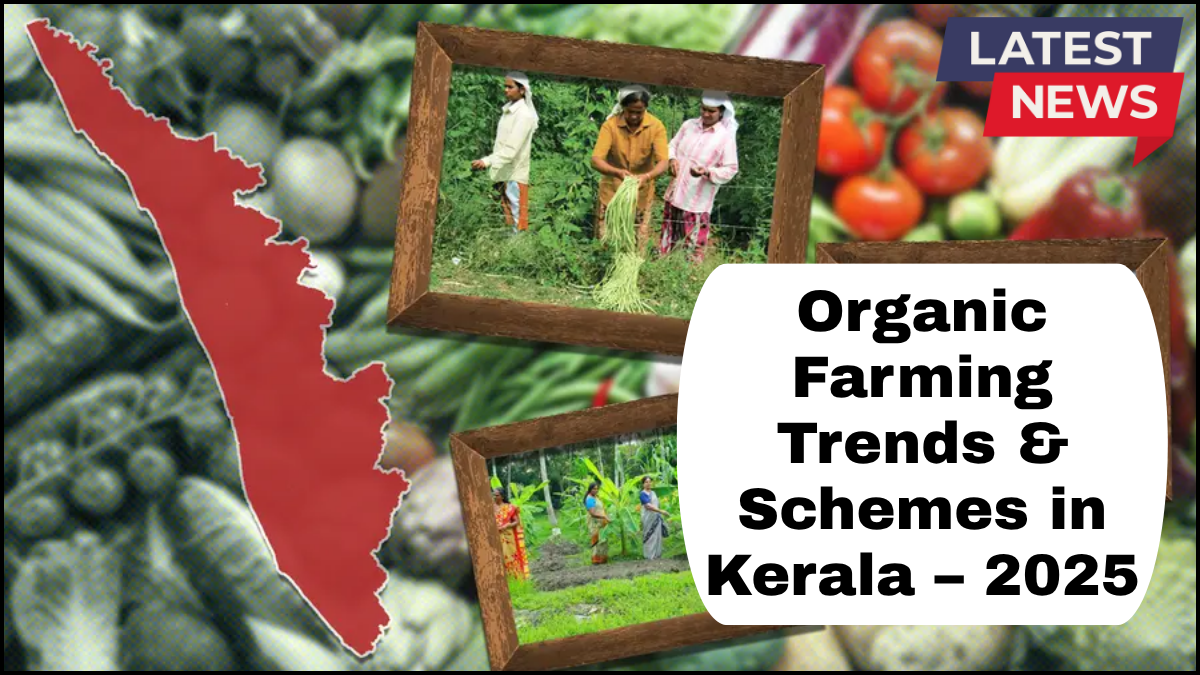Kerala has always held a distinct position in India’s agricultural map, known for its lush landscapes and progressive approach to farming. In 2025, the organic farming trends in Kerala are undergoing a transformative shift. With growing consumer awareness, environmental urgency, and state-backed incentives, organic agriculture is no longer just a movement—it’s becoming a sustainable business model.

Below, we explore the latest trends, government schemes, and how these developments are shaping the future of the agriculture business in Kerala.
Organic Farming Trends in Kerala – 2025
1. Rise of Organic Clusters and Farmer Cooperatives
One major trend in 2025 is the formation of organic farming clusters. The Kerala government, along with local agricultural bodies, has initiated several cluster-based approaches where farmers are grouped geographically and trained collectively. These clusters promote shared resources, bulk certification, and market linkages, helping small-scale farmers transition from conventional to organic methods without the burden of going solo.
2. Tech-Integrated Organic Agriculture
Digital transformation is making its way into Kerala’s organic farms. From soil testing mobile apps to AI-powered pest control systems, farmers are increasingly using technology to optimize yields while maintaining organic standards. Platforms like Krishi Bhavan’s Smart Agriculture dashboard allow farmers to monitor rainfall, crop cycles, and soil health—making organic farming more predictable and profitable.
3. Agri-Tourism and Organic Lifestyle Integration
Kerala’s rich eco-tourism landscape is now merging with organic agriculture. Organic farms are opening their gates to tourists looking for farm-stay experiences, creating new revenue streams for farmers. Visitors engage in activities like planting, harvesting, and organic cooking—blending sustainability with cultural exchange. This hybrid model is becoming a cornerstone of Kerala’s agriculture business ecosystem in 2025.
4. Increased Demand from Urban Consumers
Urban centers like Kochi, Thiruvananthapuram, and Kozhikode are seeing a spike in demand for organic produce. Supermarkets, e-commerce platforms, and farm-to-table delivery models are responding by sourcing directly from certified organic farmers in the state. This urban-rural linkage is fueling investment and stability for growers practicing chemical-free farming.
Government Schemes Supporting Organic Farming in Kerala
Kerala’s government has rolled out multiple schemes to strengthen the organic farming ecosystem, offering both financial and logistical support.
1. State Organic Farming Policy
The updated 2025 Organic Farming Policy focuses on doubling organic farmland acreage, providing certification subsidies, and promoting local seed banks. The policy also mandates organic zones in ecologically sensitive regions, including the Western Ghats.
2. Paramparagat Krishi Vikas Yojana (PKVY)
Though centrally initiated, the PKVY is being aggressively implemented in Kerala. It provides Rs. 50,000 per hectare over three years to help farmers transition to organic methods. The fund covers training, certification, and packaging, making it easier for marginal farmers to enter the organic space.
3. Kerala Agro Industries Corporation (KAIC) Support
KAIC offers machinery at subsidized rates for composting, irrigation, and weeding—especially suited for organic farms. These tools reduce manual labor and improve productivity without violating organic standards.
4. Organic Certification Made Easy
To simplify organic certification, the state has partnered with agencies like INDOCERT and the Participatory Guarantee System (PGS). Farmers can now get certified in under 90 days, a huge improvement from the 6–12 months it took earlier. Certification opens access to premium markets, both domestically and abroad.
How These Trends Impact the Agriculture Business in Kerala
The convergence of modern techniques, policy support, and rising consumer awareness is making organic farming a viable agriculture business option in Kerala. Entrepreneurs are setting up organic processing units, retail chains, and export hubs for products like organic spices, medicinal herbs, and coconut-based goods.
Moreover, banks and venture capital firms are now recognizing the potential of organic farming startups, offering loans and incubation support to agripreneurs.
Frequently Asked Questions (FAQ)
Q1: Is organic farming profitable in Kerala in 2025?
A: Yes. With better market access, government subsidies, and rising demand, organic farming is increasingly becoming profitable, especially when operated as part of a cooperative or farm cluster.
Q2: What are the key crops grown organically in Kerala?
A: Rice, banana, coconut, pepper, ginger, and turmeric are among the most commonly grown organic crops in Kerala due to their traditional and commercial value.
Q3: How can a farmer get certified for organic farming in Kerala?
A: Farmers can apply for certification through INDOCERT or use the PGS (Participatory Guarantee System) supported by local Krishi Bhavans. Assistance is provided under various schemes.
Q4: Are there any training programs for organic farming?
A: Yes. The Department of Agriculture, Kerala Agricultural University, and various NGOs regularly organize training on organic practices, composting, and natural pest control.
Q5: What is the biggest challenge in organic farming in Kerala today?
A: The main challenges include pest management without chemicals, initial low yields during transition, and the need for better logistics and cold storage infrastructure for perishable organic produce.
click here to learn more
